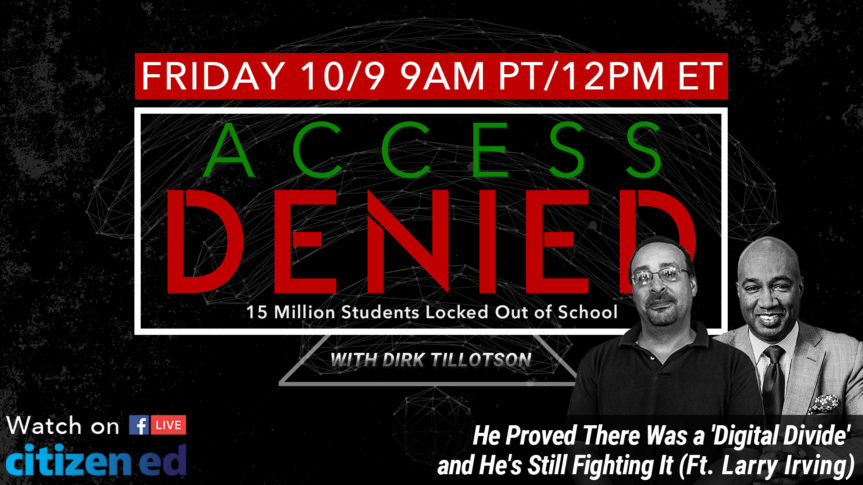Watch the show here
THIS WEEK IS DIGITAL INCLUSION WEEK.
We are closing off this amazing week with our livestream, discussing the #DigitalDivide and solutions to close it. Share this video today with #DIW2020 and raise awareness, tag your local elected officials, tag the Federal Communication Commission, and tag your Congressperson! Get active! Get heard!
Here at Great School Voices, we have been throwing around certain terms as if we all understood them, like “Digital Divide”. Infact, we even use it as a hashtag, #DigitalDivide. We have one incredible person to thank for identifying the digital divide, and that person is this week’s guest, Larry Irving.
Simply put, the digital divide is the gap between those who have and those who lack access, or reliable access to technology resources (think computers, smart phones or internet-capable devices), the internet (think wifi hotspots, cable lines, broadband), and the proper technical support to use them seamlessly (think of in-language customer support, instructions, or help). In today’s society, the internet is a lifeline that connects people to school, job applications, doctor visits, and other vital resources. Today, #InternetIsAUtility, and those on the wrong side of the #DigitalDivide are being denied access to reach their full potential.
Larry Irving produced the first empirical study proving the existence of the digital divide over twenty years ago. Read his co-published paper, Falling Through the Net: Defining the Digital Divide. Larry was a member of President Clinton’s transition team focusing on telecommunications issues, and President Obama’s transition team on science and technology. Larry’s work helped provide support for legislative initiatives such as the E-Rate program, and in conjunction with NTIA’s TIIAP, he helped push for internet connectivity in schools, libraries, hospitals, and other public access institutions where the under-served could access the internet for free. He is a tireless advocate in closing the digital divide, and is relentlessly fighting for a more equitable and connected future. This year, Larry was inducted into the Internet Hall of Fame.
Right now, the Federal Communications Commission identifies a minimum of 25 Mbps for download speeds and 3 Mbps for upload speeds. With such a dismally slow speed officially recognized as our federal benchmark, the FCC has been able to tout a high level of broadband connectivity: 99.96% of Americans have one or more broadband provider. Unfortunately, the FCC seems to be purposefully using a slow rate to boost their connectivity numbers. We must utilize a significantly higher rate to accurately reflect the speeds we need for modern internet usage.
Furthermore, the FCC must redefine their definition of internet access to include the fact that millions of Americans cannot afford internet plans, live in rural areas without reliable connectivity, and lack the support to gain internet access. We recognize the digital divide disproportionately impacts the economically disadvantaged, those living in rural areas, the elderly, the disabled, those who need in-language support, and many more. Basically, even if there is internet available, if you can’t afford it, or just plain ole can’t access it, then you don’t truly have internet access.
As of today, over 15 million students lack reliable access to the internet. This lack of access is preventing students from properly attending classes and is an incredible impediment to learning. Our current COVID-19 pandemic is forcing students online to attend school. However, without proper internet access, computers, devices, or even culturally competent/in-language support to set up connectivity, how can we expect students to attend online classes, let alone learn and excel? We must think of the long-term consequences of the digital divide and focus resources to bridge that gap.
Larry has been fighting for a more equitable online future, but implores every American to join the fight and raise their individual voices as well. This November, we not only need to vote (and get some great voting posters to share here), we must make our digital needs heard by elected officials. We need to focus on not just federal change, but to push forward local initiatives. Take action and create change.
If you would like to engage in ongoing #InternetForALL actions, please reach out to your local elected and congress persons
To find who your Senator and Assembly Members are, click here.
If you would like to add your voice, share and sign this petition: https://www.change.org/InternetForAllKids
Highlights
What do you think? Let us know and share the video with your networks.
#InternetForAll #DigitalInclusion #DigitalDivide #AccessDenied
Don’t miss the next episode of “Access Denied” on our Facebook Live on Wednesday, October 21st, at 4PM Pacific Time/ 7PM Eastern Standard Time.

